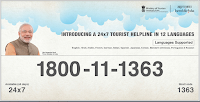Financial inclusion is becoming a priority for policymakers, regulators and development agencies globally: World Bank
Financial inclusion has been
identified as an enabler for 7 of the 17 Sustainable Development Goals. The G20 committed to advance
financial inclusion worldwide and reaffirmed its commitment to implement the
G20 High-Level Principles for Digital Financial Inclusion.
Since 2010, more than 55
countries have made commitments to financial inclusion, and more than 30 have
either launched or are developing a national strategy. Our research indicates
that when countries institute a national financial inclusion strategy, they
increase the pace and impact of reforms.
Countries that have achieved the
most progress toward financial inclusion have put in place an enabling
regulatory and policy environment, and have encouraged competition allowing
banks and non-banks to innovate and expand access to financial services. However,
creating this innovative and competitive space has to be accompanied by
appropriate consumer protection measures and regulations to ensure responsible
provision of financial services.
- Digital IDs make it easier than ever before to open an account
- Digitization of cash-payments is introducing more people to transaction accounts
- Mobile-based financial services bring convenient access even to remote areas
- Greater availability of customer data allows providers to design digital financial products that better fit the needs of unbanked individuals
As countries have accelerated
efforts toward financial inclusion, it has become apparent that they face
similar hurdles which impede their progress. These include:
- Ensure financial access and services extend to hard-to-reach populations, including women and the rural poor
- Increase citizens’ financial literacy and capability so they understand different financial services and products
- Make sure everyone has valid identification documents, and a low-cost, accessible means for them to be authenticated
- Devise useful and relevant financial products, tailored to consumer needs
- Establish robust financial consumer protection frameworks, and adapt relevant regulatory and supervisory authorities, including by utilizing technology to improve supervision (so-called “regtech”)
- Globally, a lack of IDs makes it hard to open a bank account, access capital and credit.
As it is Published by World Bank, Last Updated: Apr 05, 2017




Comments